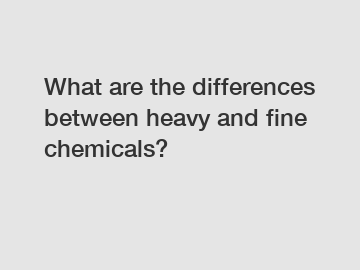What are the differences between heavy and fine chemicals?
Have you ever wondered what sets heavy chemicals apart from fine chemicals? While both types of chemicals play important roles in various industries, understanding the differences between them can help you better appreciate their unique properties and applications. In this blog post, we'll explore the distinct characteristics of heavy and fine chemicals, highlighting their key differences and the industries they serve.
Heavy chemicals, also known as basic or commodity chemicals, are large-volume chemicals that are produced in high quantities for use in a wide range of industrial applications. These chemicals are typically manufactured through basic chemical processes such as synthesis, distillation, and purification. Heavy chemicals are used as raw materials in the production of a variety of products, including plastics, fertilizers, detergents, and pharmaceuticals.
One of the main characteristics of heavy chemicals is their high production volume and relatively low cost per unit. These chemicals are essential for the manufacturing of everyday products and are produced in large quantities to meet the demands of various industries. Examples of heavy chemicals include sulfuric acid, sodium hydroxide, and ammonia, which are used in a wide range of industrial processes.

Fine chemicals, on the other hand, are high-value chemicals that are produced in smaller quantities and are often used in specialized applications. These chemicals are typically produced through more complex chemical processes, such as organic synthesis, chromatography, and crystallization. Fine chemicals are used in the pharmaceutical, biotechnology, and specialty chemical industries to create high-quality products with specific properties and characteristics.
One of the distinguishing features of fine chemicals is their high purity and quality. These chemicals are often produced in small batches to meet the specific requirements of customers in industries such as pharmaceuticals and biotechnology. Fine chemicals are highly specialized and are designed to meet strict regulatory standards for safety and efficacy, making them essential for the production of life-saving drugs and medical devices.
While heavy chemicals and fine chemicals serve different purposes and industries, they both play important roles in the global economy. Heavy chemicals are essential for the manufacturing of everyday products and industrial materials, while fine chemicals are critical for the production of high-quality pharmaceuticals and specialty chemicals. Both types of chemicals are essential for modern society and are produced by a wide range of companies around the world.
In summary, the main differences between heavy chemicals and fine chemicals lie in their production volume, cost per unit, and applications. Heavy chemicals are produced in large quantities for use in a wide range of industrial applications, while fine chemicals are produced in smaller quantities for specialized industries such as pharmaceuticals and biotechnology. Understanding the distinctions between heavy and fine chemicals can help you appreciate the important roles these chemicals play in our daily lives and industries.
If you want to learn more, please visit our website Technical Naphthalene Manufacturer, coal tar pitch manufacturer, China wholesale chemical company.
194
0
0

Comments
All Comments (0)